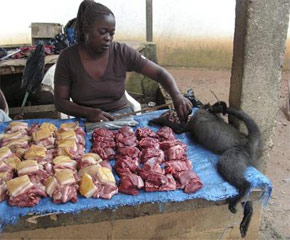Around 25 diners sit on bamboo chairs at this open-air restaurant on the outskirts of Cameroon’s capital Yaounde, waiting for a plate of monkey, pangolin or bush pig washed down with red wine, beer or aromatic freshly tapped palm wine.
Environmentalists say the hunting and trade of endangered animals from the world’s tropical forests must be reduced if rare primates and other species are to be saved from extinction.
Some campaigners want a total ban on bush-meat or at least on its commercial trade. This would allow local people to hunt only fast-breeding, non-endangered species to feed their families.
A report published said such blanket bans would fail and, if enforced, deprive poor families living in forest regions of much-needed nutrition and cash earnings.
The report by the Secretariat of the United Nations Convention on Biological Diversity said legalizing parts of the bushmeat trade could dispel the stigma attached to it, aid regulation and help efforts to save endangered species.
“Bushmeat, in particular, offers a number of benefits to forest-dwelling populations. It is an easily traded resource as it is transportable, has a high value/weight ratio and is easily preserved at low cost,” the report said.
A survey a few years ago estimated 70-90 tons of bushmeat a month were being sold in Yaounde’s four main markets. Across West and central Africa, the trade is worth as much as $200 million, and $175 million in Latin America’s Amazon basin.
Supporters of a more general ban say regulating sales of some animals but not others would be too complicated.
Animal part aphrodisiacs
The international trade in bushmeat is small but there is growing expatriate African and Asian demand, the report said.
Often it is linked to the lucrative global trade in animal body parts believed to have secret powers or employed in medicines, such as gorilla meat or rhino horn – long used as aphrodisiacs.
Smart cars parked outside an exclusive restaurant in Yaounde bear witness to the bushmeat trade’s wealthy connections.
Elegant waitresses offer patrons a menu of mainly common game – pangolin, antelope, bush pig, monkey, cane rat and viper – at prices of 5,000-10,000 CFA francs ($11-$22) a dish.
Cameroon has some of the region’s strictest anti-hunting laws. Critics say that, as elsewhere, they are rarely applied.
“It is outrageous that the majority of these countries do not even have a single prosecution,” said Ofir Drori, founder of the Last Great Ape Organization Cameroon.
Is this a conservation issue or does the survival of the locals depend on “bushmeat”?

